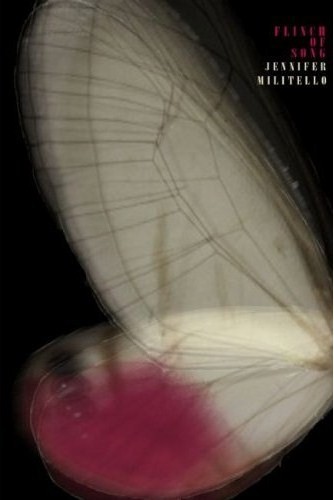Issue 3 - Spring 2010 Reviews American Fractal American Prophet Contents of a Mermaid's Purse Easy Marks Entrepôt Flinch of Song I Have to Go Back to 1994 and Kill a Girl In the Voice of a Minor Saint Sarah J. Sloat No Boundaries: Prose Poems by 24 American Poets Noose and Hook Please Self-Portrait with Crayon Some Weather The Best Canadian Poetry The Ravenous Audience Underlife Voices Interviews
 |
Winner of Tupelo’s 2009 First Book Award, Jennifer Militello’s Flinch of Song simply astounds. More than a collection of poems, the book is an orchestral piece where the elaborate musicality of language coaxes meaning into its fragile existence. As such, the logical structure of the meaning that ghosts through each of Militello’s poems is exotic and elusive, while at the same time familiar and plainly visible. It is seen always slant, always indirectly, as if embedded in the reader’s peripheral vision. We can get only so far into these poems by relying on narrative structure or strictly logical development of a given theme. But if we open our minds to the musicality and resonant imagery in the language, our imaginations, dreams, and desires will take us the rest of the way in. Suddenly the poem will present itself to us fully: a jinn revealed in the space between sight and blindness, comprehension and imagination. The poem Militello wrote always yields to the poem we read, creating a text layered with our own personal meaning. Indeed, the poem “Instructions to a Portraitist” reads like a guide on how the reader should, in essence, create the poems in this collection:
Because of its title and first-person speaker, the poem asserts itself as depicting a person being painted. However, the only two mentions of body parts (eyes and teeth) are embedded in such chimerical language, that the visual picture never assembles into a realistic depiction of a person, bringing Picasso’s last self-portrait to mind. As with abstract painting, Militello’s poems are only half comprised of the ostensible subject. The other half is comprised of a vision of the world in which the subject is situated. The subject, then, is actually an intersection of itself and its context, and in this poem, as with many others in the collection, the context is comprised of both interior and exterior landscapes. The subject of the portrait/poem essentially becomes the inseparability of a given self and its world, and the reader cannot gaze on the self—indeed him or herself—without gazing on the world. Similarly, the gaze of the reader is deflected away from the ostensible subject in the poem “Resignation:”
The poem is driven by the image of clothes drying on a laundry line. However, this is never actually stated. In fact, the very words “laundry line” are disclosed with all the grammatical impotence of an adjectival aside, tucked way in a prepositional phrase. The image is created more in our minds than in the words supplied, and it is such a common image that we can quickly bring it to mind with no more than the skeletal smattering of words. The poem continues its development accordingly: “How nudity looks. . . /on the body,” and “stringbean root” give us the feeling of vulnerability and fragility. “[D]ust, though not the kind/the winds kicks up” and “serene lake” give a sad, quiet, image of neglect. “Lilies” invoke martyrdom. And “sarcophagi” and “the ash/of last daylight:” ultimate resignation of life to dust. The speaker does not present these images in the logical chronology I have spelled out, nor does she make sense of them for us: that is work we do, intuitively, based on our common human experience. Such human commonality is expressed throughout the book. In keeping with Militello’s elliptical style, I will offer snippets taken from a few poems to illustrate this, and present them with ample white space to be fully absorbed, as they are presented in the poems themselves (Such innovative poetry demands nontraditional ways to critique it): “Add to me a long stretch of wetlands/and the dying off of birds” “I want to sleep under the jawline/of a town of balconies, to dream as//the desert in my elbow expands to my wrist.” “Last night I wore a shift of stars, buttoned/at the sleeve.” In these and other moments, we see the speaker’s body as an open site of complete inclusion, but Militello’s speakers stop short of asserting with Whitmanesque confidence that their bodies contain multitudes. “Add to me,” “I want to sleep under. . . to dream as,” “I wore a shift of”: The speakers in these poems go no further than to invite the world into themselves, but the reader completes the scene: these poems read as if the speakers’ bodies truly do encompass the multitudes. Not only are the speakers’ bodies all-encompassing, but so too are their movements, every one of their lived moments. For example, in “There’s No Such Thing as a Typical Day,” we hear,
Simply being awake institutes an intimate connection with the suffering of others whom the speaker doesn’t even know. It is enough to know that there is suffering in this world, experienced by someone at every moment. And the poem suggests that only when you realize this can you be said to be fully, truly awake. The perfect balance Militello maintains between abstraction and concreteness is what makes this poem work so well: describing an unknown man’s suffering as “lakes of constellation” is concretely anchored in time and place by “the stars I see from the back of my underfed horse.” All but a few of the poems in the collection are in couplets and tercets, and the traditional stanzaic form has the effect of making the reader always feel on familiar ground, however far Militello’s resolutely elliptical language takes us from the hold of logical reasoning and narrative structure. The result of this form and content pairing is that the world of her language becomes our new familiar. Each time I finished a reading of Flinch of Song, I sat back and asked, how did she do that? Each of her poems is a self-contained experience, and they are collectively held together by the musical power of language. Its cadences, pacing, sound symbolism, and imagery lead the beguiled reader into interior spaces which are previously unknown and at the same time strangely familiar. I look forward to discovering what her next collection of poems will reveal about what I didn’t realize I already knew. Reviewed by Christina Cook. |
